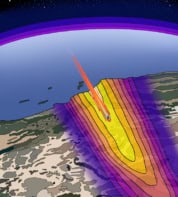
A key part of a UK-led project to investigate the feasibility of injecting particles into the stratosphere with the aim of cooling the Earth has been cancelled. In what would have been one of the first trials of geoengineering, the Stratospheric Particle Injection for Climate Engineering (SPICE) project will now not undertake field tests. Instead, the project will be restricted to lab experiments and computer simulations.
SPICE is led by Matthew Watson from the University of Bristol and mainly funded by the UK’s Engineering and Physical Sciences Research Council (EPSRC). The trial would have involved pumping water to a height of 1 km through a suspended hose that is held aloft by a helium-filled balloon. This would have tested the technology behind potentially spraying particles such as sulphur into the stratosphere, which would mitigate global warming by reflecting a few per cent of incoming solar radiation.
Last month, a statement by the SPICE team said it would not now progress with the trial stage of the project. This, it says, is because EPSRC had not given the go-ahead for a “stage gate” that would have opened the door for a public consultation about the technology before trials could begin. “It’s their money so we can’t spend it on something they’ve expressly told us not to do until we get the green light,” says SPICE member Hugh Hunt, a mechanical engineer at the University of Cambridge, UK. “They’ve taken a very long time and we’ve decided we’ve had enough of waiting.” Hunt adds that “when the moment is right” the researchers may try and perform a “test-bed” experiment but it will not be as thorough as the original SPICE trial.
Another reason why the trials have been cancelled is that a patent was submitted by Peter Davidson, who runs the UK consulting firm Davidson Technology, together with Hunt and his Cambridge colleague Chris Burgoyne. Filed before SPICE was proposed, the patent describes the apparatus and method that SPICE would use to deliver particles into the atmosphere. Although no-one has accused them of any wrongdoing, some members of the team think that the involvement of a patent might give opponents of the project ammunition to claim that people are gaining financial benefit from it.
“Given the emotive nature of geoengineering, research projects such as SPICE need to be squeaky clean – with no suggestion of vested interests,” says climate scientist Peter Cox from the University of Exeter, UK. The SPICE team will now concentrate on lab tests and computer simulations to determine what possible particles would work best in the stratosphere and to estimate the overall impact on the Earth’s climate.




